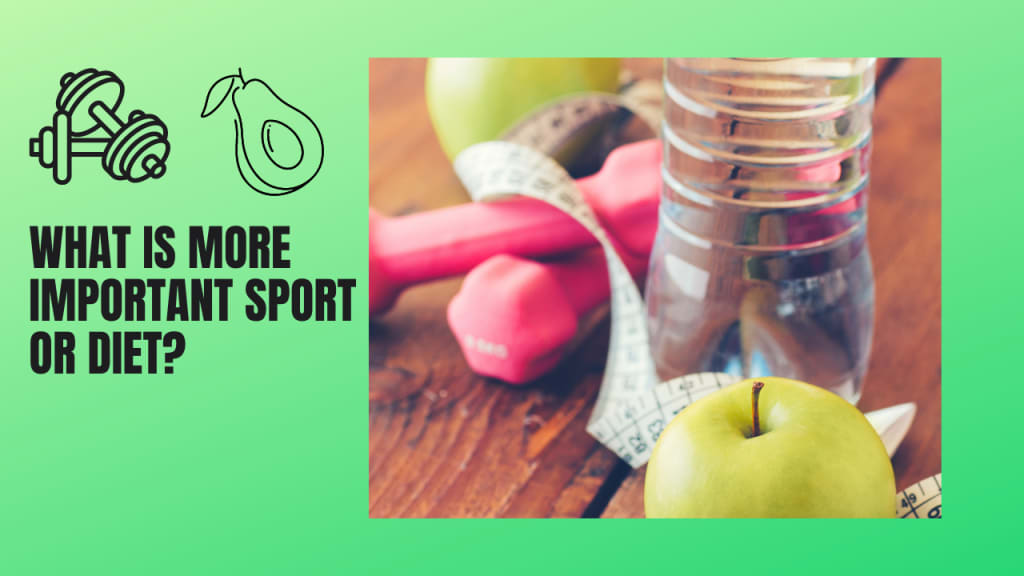
People are advised to eat a balanced diet in order to minimise calorie intake and improve health. Obesity is the most common global health problem, and the intake of food is a major contributor to it. In order to help people lose weight, it is important to minimise calorie intake. However, the question arises: what is more important in terms of weight loss – physical activity or diet?
1. The study in question and its findings
Some experts say that physical activity is more important, while others say that diet is more important. The study conducted by researchers from Kyoto University School of Medicine looked into this question. According to the study, eating a balanced meal with appropriate nutrients leads to better weight loss and reduction in fat mass than regular exercise (which can have a negative impact on weight gain) and even very little exercise that yields no effect on weight and fat mass (which can lead to poor health effects).
The team performed an analysis of 13 studies on the effects of physical activity versus diets on weight loss. The researchers found that physical activity was more effective than diets for reducing obesity-related morbidity (fatal or non-fatal). They also found that eating a balanced meal with adequate nutrients led to better weight loss and reduction in fat mass than regular exercise (in addition to having no effect on body composition) and even very little exercise that yielded no effect on body composition (this includes walking).
The team also found using one’s own body as a reference point for dieting cannot be used as an accurate measure since not all people are alike in terms of their metabolic rate/body metabolism. For example, people who have lower basal metabolism have less calories consumed due to greater energy expenditure than others who have higher basal metabolism. According to previous studies, such people can lose less weight when they eat more calories after exercising compared with those who eat fewer calories before exercising. The team concluded that there are still differences between the groups in terms of their metabolic rates/body metabolism; therefore, not all people will lose the same amount of weight when they consume fewer calories after exercising compared with those who consume more calories before exercising; therefore, these results do not apply universally across all populations or individuals with different metabolic rates/body metabolism. On another note: despite many studies suggesting people should exercise regularly for health benefits, some experts say this should be replaced by "continuous moderate physical activity" such as walking or other forms of physical activity for 2–3 hours per week.

2. How diet affects weight loss more than exercise
Popular diets like the Atkins diet and the South Beach diet have been around for years. The idea behind these low-carbohydrate diets is that carbohydrates in high doses don’t seem to be a problem, and will actually help you lose weight. But a new study has found that the types of carbs you eat might make all the difference when it comes to weight loss.
People who eat a lot of bread, pasta and potatoes may be far more likely to reach their weight reduction goals than those who do not. This is because some types of carbs are processed by your body differently than other carbs, which can lead to lower blood sugar levels, or in other words, weight loss.
And once we reach our weight reduction goals, we might find we don’t want to go back on our diets as quickly as we thought—because it turns out that once you lose that much weight, you want to keep it off!
3. What this means for people trying to lose weight
Two new studies suggest that people should focus on losing weight rather than exercise for greater success with reducing body mass.
The first study, led by the University of Western Florida (UWF) and published in the journal Obesity, looked at the effects of diet, physical activity and a combination of physical activity and diet on weight loss in overweight adults aged 45 to 60. The researchers found that those who ate fewer calories gained during the first year after starting a diet program lost more weight than those who exercised more or ate fewer calories.
The second study, conducted by researchers from Columbia University's Mailman School of Public Health and Brandeis University, focused on women who were trying to lose weight. The researchers analyzed data from nearly 4,800 women who participated in Weight Loss Month (November 2013 through March 2014) as part of a large-scale randomized trial to evaluate long-term effects on body composition after they started a dietary intervention program to reduce their calorie intake to lose weight.
They found that women who ate fewer calories lost more muscle mass when they started their diet program than those who exercised less or ate additional calories (the latter group did not see any difference).
4. Some tips on dieting for weight loss
In a study published in the journal Diabetes Care, researchers examined the diets of 1,200 middle-aged adults and found that those who were considered overweight or obese were the most likely to cut out carbohydrates from their diets.
The study analyzed data from 25 different studies involving more than 28,000 individuals and found that participants who had been classified as overweight or obese were nearly twice as likely to forgo carbohydrates as those who had been classified as normal weight.
"We found that people with elevated BMIs were more likely to avoid carbohydrates," Dr. Timothy Smith, one of the authors of the study and a researcher at Penn State University, said in a statement. "We also found that these people also began to self-monitor their diet and make it a priority."

5. The importance of maintaining a healthy diet even after losing weight
Based on a recent study by the University of Milan, the importance of maintaining a healthy diet is not as clear-cut as it appears. In fact, according to the study, weight loss and physical activity are more important than diet in fighting obesity.
The Italian researchers used data from the Italian National Health Registry and found that people who lost weight had a higher body mass index (BMI) than people who did not lose weight. The researchers also found that people who lost weight were significantly more likely to be overweight or obese five years later compared to those who did not lose weight.
The findings could help doctors provide more accurate treatment during their patient’s health checkups, since it will be easier for them to assess whether they need to lower their BMI further after losing weight. The findings come at a time when obesity rates continue to rise in many developed countries including Italy, Germany and Japan.
6. Exercise and weight loss: debunking some common myths
A lot of the discussion around exercise and weight loss has focused on the physical activity of walking, running, gardening and other forms of informal exercise. But for any activity that involves getting your heart rate up and sweating profusely, diet is more important than exercise.
A new study from researchers at the University of Warwick has found that a healthy diet is actually more important than regular physical activity to lose weight, because active people who eat well and are in good shape are in with a better chance of losing weight than those who are sedentary. The study, published in the journal Obesity Science & Practice , suggests that this is not just because physical activity can be harmful — it is also because a healthy diet can be as effective as any form of exercise.
The researchers looked at data collected from almost 3 million adults across the UK over two years, looking at how they ate over their lifetime (through surveys) and how they exercised (through questionnaires). They found that fat intake was consistently linked with obesity levels — but leisure time physical activity was not. In fact, sedentary people who were more likely to be overweight had an even greater risk of obesity than those who were more physically active.
This does not mean you should skip out on your exercise routine just yet; keeping fit will certainly help you maintain a healthier weight later on down the line. But regardless of what type of sport you choose to indulge in, it’s important to remember that when it comes to shedding pounds, diet may be just as important as regular exercise — if not more so!
7. Conclusion
If you want to lose weight, diet is more important. In fact, diet has more influence on weight gain than physical activity like walking, fidgeting and formal exercise. but both are important of our health.
The researchers collected information on body mass index (BMI), the amount of calories in your body, height, age and gender. They then looked at how habits affected weight gain rather than fat loss.
The study found that if you wanted to lose weight you needed to do more than just weigh yourself daily and eat a healthy diet or have regular exercise. It was also essential for people to be able to control their eating habits and exercise activities.
The findings mean that changing your lifestyle could help you drop pounds faster this year than you thought possible - even if it's only a few pounds at a time, says Dr Jennifer Johnson of the University of Southampton. She says: "It is often assumed that we need to change our behaviour in order to lose weight but there is no evidence that this is really true."






Comments
There are no comments for this story
Be the first to respond and start the conversation.